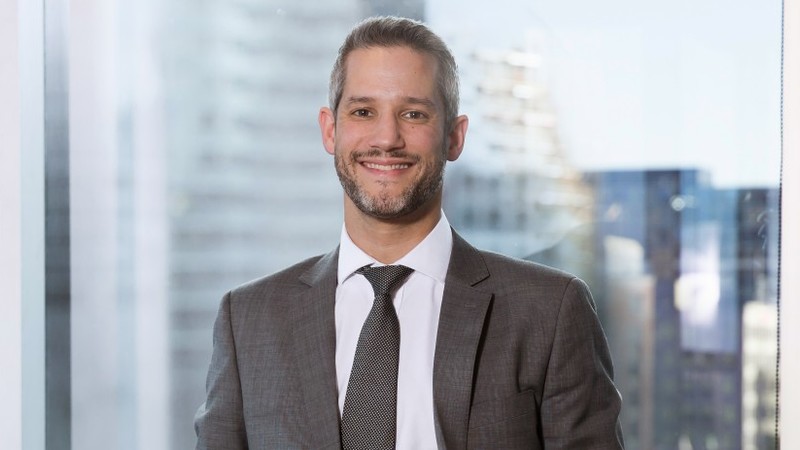Pete Watson of Rec to Rec agency Mint Recruitment interviews David Braham as part of his Recruitment Entrepreneur Series.
What direction did you think your life was going to take before you entered the recruitment industry?
Honestly? I had no idea. I always had that question in my head as to “what am I going to be when I grow up”, and I think even into my twenties and thirties I still asked the same question. So like many, I fell into recruitment.
I expected to be in business and I expected to be in a commercial role like marketing or sales, and I did indeed work in marketing but found very quickly I was bored. And so I did what everyone else did and went to a recruiter to find a job, and they said, "Come and work for me." I said, "Why not?" and found that I was pretty good at it and enjoyed it.
When did you have that lightbulb moment that told you “I’m going to start my own recruitment business”?
I don't think I can pin-point an exact time.
I was with Michael Page, and I did three years in the UK and then had the opportunity to come to Australia and a two year stint turned into five years.
During those five years at Page, I met Paul (Hallam, Co-Founder) and Nick (Hindhaugh, Co-Founder).
We realised in time we were quite like minded and we just had this vision that we really wanted to do things differently, with a strong focus on quality, consulting, and building genuine relationships, rather than activity based KPIs and a volume focus.
We had a number of conversations over many years, over many coffees. Eventually we just said "You know what? Let's give it a crack." There was no light bulb moment, it just made sense and after three years of casual discussions we got more serious.
What early mistakes did you make that looking back make you cringe?
I don't know that there were any specific mistakes. There was just a whole heap of learning every day. We had gone from being really good recruiters to doing things we’d never done before like reviewing legal contracts for offices, to setting up IT systems and processes. So I think every day was about learning, and it was kind of the blind leading the blind.
We were constantly on the phones trying to win new business, but also trying to grow a company.
We always took time to analyse and self-reflect, daily and weekly. We were pretty hard on ourselves. We always asked ourselves “What can we do better?” And we were always pushing the boundaries. This is evident, even today, through some of our company behaviours, such as ‘challenging’ and ‘being the best’.
In the first couple of years, we did make some bad hires. They were bad choices on our part. Not that they were bad people. When you’re a three-man band, it's extremely hard to attract people.
But if I look back now on mistakes and learnings, it was always people related. "How do we engage better? How do we coach better? How do we train better?"
As we have become bigger, it's still about the people, but a focus on enablement. How do we make the job of recruitment better, more effective and more efficient from a process perspective?
We’ve had year on year growth nearly every year from day one, but we’ve also made all the classic mistakes like office space or implementing software that doesn’t do what we thought it would!
What period of your business journey gave you the most sleepless nights?
People talk about the GFC causing sleepless nights but we were quite unique and were very busy during that period. In fact, in ’08-’09, we might have gone backwards only by about 1% which was a great achievement.
The most sleepless nights in the early days came within the first 12 months of opening the business. We got invited to do some big PSA tenders for Kraft and Nestle. And we'd never responded to a tender before in our lives!
So the pressure was on to pull a document together. Our tender documents today are very polished and articulate but back then it was a hundred pages. I mean, it was like a book. It took weeks to write and rewrite.
At what point in the growth of Six Degrees did you become comfortable letting go, and letting others take on greater responsibility?
We realised very early on that this business would have no real value if it was just Nick, Paul, and David, and I don't mean value from a sales perspective. I mean there's just no value in the business because it's only about Nick, Paul, and David.
We went through a process of creating a management structure where we probably didn't need it early on, but thought it was important to appoint cultural leaders and champions. This gave senior consultants the opportunity to champion a project and be a leader, even if they weren't managing people.
Then we created a formal management structure around 2007 when we were actually big enough to have a management group.
Looking back, if we’re honest with ourselves, I think we were trying to say we were letting go, but we weren't. You know, we still made decisions and influenced the managers to make the right decisions, and that's being honest. So do I think we could have done it better? Yes. Is it natural what happened? Absolutely. It's very hard to let go when you have a way of doing things that you know works.
It's probably only been in the last three or four years that we've genuinely let go and given accountability to our leadership group, but unless you've got the capability and confidence in your leadership group, you're never going to be able to do that.
As an employer, you have a huge responsibility to others. How does that make you feel?
You know, you asked me what keeps me up at night now, its people! Always people! Six Degrees is our baby. It's our life, but it couldn't be what it is without our people.
It's the number one topic of conversation at every leadership meeting and really does play into every conversation we have. We have always been advocates for diversity and therefore have a strong gender mix and are very proud of the family friendly environment we have created. We've always been very cognizant of that.
We've had people with all sorts of personal and professional issues in their lives and we take that responsibility very seriously.
You would know in this industry, Pete, that our people are attractive to our competitors. Therefore, commercially we understand retention is key. So what do we need to do to ensure our people are happy, challenged and engaged so they stay?
For us, our number one is our people; how they feel, their mental well-being, their physical well-being, their professional development. Everything we do is about our people.
And we’ve been recognised for this in the industry. Just last week we won “Best Recruitment Company to Work For” at the Recruitment Industry Awards.
Do you have a mantra that you live by, or regularly quote to others?
Yes. I run many of our training and induction sessions here. And this may be a bit cliché, but I start with the premise that “knowledge is power”.
“Knowledge is power” has its own connotations but what I mean by that is, you can't succeed in anything without gaining information first, which means you have to listen, and ask questions before you make any kind of decision or choose a course of action whether they be business decisions or on a specific recruitment process.
Behind the scenes, what are the hidden factors that you attribute your success to (that people may not know)?
Fear of failure is what drives me personally.
Occasionally I can be a bit cynical. Now, that doesn't mean I'm negative. It means that I look for ways to improve everything. If someone has an idea, I ask questions that will help them improve on their thinking, or prepare for the problem before it arises. That's how I think and how I drive our people to be the best they can be.
It's lucky that it's not just me running the business; I’m balanced by Paul, Nick and the rest of the leadership group. And that's what you always need. The secret to success is balance.
At this stage of your life and career, what's your key motivator?
Put simply, I love the business that we've created. I love the people that work with us. I'm passionate about this business. My passion for recruitment probably ebbs and flows. I've done it for 20 years and I’m only human, but my passion for the people and Six Degrees and delivering for our clients, and being a successful business every day is what I get out of bed for.
What’s the single biggest change you’ve seen in the recruitment industry over the past few years? And do you like it?
Obviously, LinkedIn, and the various social media platforms and technology that allow clients not to have to rely on recruiters as much, along with savvy talent who want to be sought out.
Then, there’s the increased capability of in house recruitment teams
And thirdly is just how competitive the market has become with so many start-ups. I can't think of a more competitive industry.
Whether I like the changes or not is irrelevant. It is what it is. We have to just deal with it, and our way of dealing with it is to always be better than we were yesterday and to evolve to stay ahead of the curve.
But despite these changes, 2016 will be our biggest year yet.
Who do you respect in the recruitment industry? And why?
There's many people and businesses I respect including some of the big global players. I might not agree with the way they do business, but they're successful business models so how can you not respect that?
There are so many business that are really good. Particularly in the niche boutique space.
There's actually more people that I respect actually than those that I don't.
I respect businesses who have similar philosophies to Six Degrees like Tandem Partners, where Ange and the team have done a great job and really own the HR space and are well respected in the HR community.
What advice would you give to a young recruitment entrepreneur starting out on their business journey?
Focus on people and process. I just cannot emphasise this enough. Forget clients and business development, and forget everything else. Keep your people happy. Keep them motivated. Look after them. Support them. Don't treat them like kids. Make sure they're well up here (points to head), and physically, and then give them the tools to be successful.
Also, you've got to make a decision about whether you want a lifestyle business or if you want to grow a sustainable business.
What does the future hold for Six Degrees?
We are in strategic planning phase at the moment. We've made a lot of change in the last 12 to 18 months. We've restructured the company and created new revenue streams. We've embedded a great leadership structure that includes marketing, HR and finance. So we’ve truly corporatised our business in the last two years, in every way. From policies, to process and training. We now have a genuine corporate structure that is not reliant on an owner operated business.
Over the next three years, we don't see ourselves going into new disciplines because specialisation is key for us, and it always will be, but we will look at new markets, new revenue streams, industry verticals and interstate growth.
Also, because most of our clients are global, going into Asia is a strong possibility.
But we've never had grandiose vision of being the biggest player. We don't want to be. We want to be the best, not the biggest.
Getting off recruitment for a minute…
The Australian Government: What should be their Number One policy priority?
Tax reform.
Donald Trump: How will you react if he becomes the next American President?
I would be amazed at the American people if they chose to elect Donald Trump. That's very judgmental of me. I'm not American and don’t live in their country, so that's their decision, not mine, but from afar, I have little respect for the guy as a politician. I have respect for him commercially. I mean, how can you not? But I don't have a huge amount of respect for his approach and style to leading such a huge economy and world power, and I would be very disappointed in the American people if he got in.

 Accessibility
Accessibility



